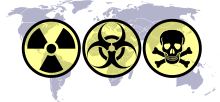이스라엘과 대량살상무기
Israel and weapons of mass destruction| 대량살상무기 |
|---|
 |
| 종류별 |
| 국가별 |
| 증식 |
| 조약 |
이스라엘은 대량살상무기를 보유하고 있으며 핵확산금지조약(NPT)[1]에 의해 핵무기 보유국으로 인정받지 못한 4개의 핵무기 보유국 중 하나로 알려져 있다.미 의회 기술평가국은 이스라엘을 미공개 화학전 능력과 공격적인 생물전 [2]프로그램을 보유하고 있는 것으로 보고하고 있다.공식적으로 이스라엘은 핵무기 보유를 긍정도 부정도 하지 않는다.
핵무기
이스라엘은 6일 전쟁 [2]직후 핵탄두 대량생산이 일어나면서 1967년까지 핵무기 운용 능력을 보유하고 있었던 것으로 알려져 있다.전문가들은 이스라엘의 핵무기 비축량을 60개에서 많게는 [3][4][5][6]400개로 추정했다.이스라엘이 보고한 열핵 무기가 [7]메가톤급인지는 알려지지 않았다.이스라엘은 또한 중성자 폭탄, 전술 핵무기, 여행용 [8]핵을 포함한 다양한 시스템을 보유하고 있는 것으로 알려졌다.이스라엘은 네게브 핵 연구 센터에서 핵무기를 제조하는 것으로 알려져 있다.
핵무기 전달
핵무기 전달 메커니즘은 사거리가 4,800km에서 6,500km인 예리코 3 미사일(2004년 소식통은 사거리가 최대 11,500km라고 추정함)을 포함하며, 도로 이동체 예리코 2 IRBM의 지역 탐지 범위를 제공하는 것으로 여겨진다.핵 [9][10]공격에서 살아남을 수 있을 정도로 멀리 지하로 도망쳤다.게다가 이스라엘은 이스라엘 해군의 돌핀급 [11]잠수함에서 발사할 수 있는 잠수함 발사형 핵 순항미사일을 사용하는 해상 핵 세컨드 스트라이크 능력을 보유하고 있는 것으로 추정된다.이스라엘 공군은 F-15I와 F-16I Sufa 전투기를 보유하고 있으며, F-16I 전투기는 적합 연료 탱크를 이용해 장거리 전술 및 전략 핵무기를 운반할 수 있으며 보잉 707의 [12]개량된 공중급유기의 지원을 받고 있다.
2006년 에후드 올메르트 당시 이스라엘 총리는 독일 TV에서 이란이 "미국, 프랑스, 이스라엘, 러시아처럼 핵무기를 보유하기를 바라고 있다"[13][14][15]고 발언했을 때 이스라엘이 핵무기를 보유하고 있음을 인정하는 듯 보였다.이는 핵무기 보유 여부에 대해 의도적으로 모호하다는 이스라엘 정부의 오랜 정책과는 대조적이었다.이 정책은 이스라엘이 "중동에 [16]핵무기를 처음 도입한 것은 아니다"라고 주장했다.모하메드 엘바라데이 전 국제원자력기구(IAEA) 사무총장은 이스라엘을 핵무기를 [17]보유한 국가로 간주했다.이스라엘의 핵 프로그램에 대해 알려진 것 중 많은 부분은 결과적으로 18년의 징역형을 받은 니게브 핵 연구 센터의 기술자인 모르데차이 바누가 1986년에 폭로한 것에서 비롯된다.이스라엘은 핵확산금지조약(NPT)에 서명하지 않았지만 [18]대량살상무기가 없는 중동지역 구축을 지지하고 있다.
화학 무기

이스라엘은 화학무기협약(CWC)[19]에 서명했지만 비준하지는 않았다.1983년, CIA의 보고서는 이스라엘이 "CW 능력이 막 싹트고 있는 아랍 국가들에 둘러싸인 것을 알게 된 후, 화학 공격에 대한 자신들의 취약성을 점점 더 의식하게 되었다"고 말했다.공격지역과 보호지역 모두에서 화학전 준비계획을 수행했다...1982년 말, Negev 사막의 Dimona Sensitive Storage Area에서 CW 신경제 생산 시설과 저장 시설이 확인되었습니다.다른 CW 에이전트 생산은 잘 발달된 이스라엘 화학 [20][21]산업 내에 존재하는 것으로 생각됩니다."
화학무기 프로그램이 네스 시오나에 [23]있는 이스라엘 생물연구연구소(IIBR[22])에 위치할 수도 있다는 추측도 있다.
사린 신경가스 합성에 사용되는 CWC 스케줄 2 화학물질인 디메틸 메틸포스폰산염 190리터는 1992년 텔아비브로 가던 중 추락한 뒤 1862편 여객기에서 발견됐다.이스라엘은 이 물질이 무독성이며 화학 무기로부터 보호하는 필터를 시험하기 위해 사용되었다고 말했다.국제규정에 따라 화물명세서에도 명기되어 있었다.이 화물은 미 상무부의 허가 하에 미국 [24]화학공장에서 IIBR로 보내졌다.
1993년 미국 의회 기술평가국 대량살상무기(WMD) 확산 평가에서는 이스라엘이 일반적으로 미신고된 공격 화학전 능력을 [2]보유한 국가로 기록됐다.빌 리처드슨 전 미국 국방부 부차관보는 1998년 "이스라엘이 오랫동안 화학 및 생물학적으로 공격적인 일을 해왔다는 것은 의심의 여지가 없다"고 말했다.몇 [25]년 동안이나 물건이 있었음이 틀림없습니다."
생물 무기
미 의회 [2]기술평가국은 이스라엘이 공격적인 생물전 능력을 개발했다는 의혹을 받고 있다.이스라엘은 생물무기협약(BWC)[26]에 서명하지 않았다.이스라엘 네스 시오나의 생물연구소가 화학 및 생물전을 [27]위한 백신과 해독제를 개발하는 것으로 추정된다.이스라엘이 화학무기를 비축하지 않는다는 것은 일반적으로 동의하고 있다.이스라엘은 아마도 매우 복잡한 생물방위 [28][29]프로그램의 결과로 생물무기를 생산하고 보급할 수 있는 적극적인 능력을 보유하고 있을 것으로 추측된다.이스라엘은 이중용도 바이오테크놀로지에 [28]대한 수출 규제 강화 조치를 취했다.
레퍼런스
- ^ "Background Information, 2005 Review Conference of the Parties to the Treaty on the Non-Proliferation of Nuclear Weapons". United Nations. Retrieved July 2, 2006.
- ^ a b c d "Proliferation of Weapons of Mass Destruction: Assessing the Risks" (PDF). U.S. Congress Office of Technology Assessment. August 1993. OTA-ISC-559. Retrieved December 9, 2008.
{{cite journal}}:Cite 저널 요구 사항journal=(도움말) - ^ https://web.archive.org/web/20150429192508/http://www.wisconsinproject.org/countries/israel/nuke.html. Archived from the original on April 29, 2015. Retrieved May 3, 2015.
{{cite web}}:누락 또는 비어 있음title=(도움말) - ^ Toukan, Abdullah, Senior Associate; Cordesman, Anthony H., Arleigh A. Burke Chair in Strategy. "Study on a Possible Israeli Strike on Iran's Nuclear Development Facilities" (PDF). Center for Strategic and International Studies. Retrieved April 2, 2015.
- ^ 브라우어, 케네스 S., "분쟁 성향: 중동에서의 잠재적인 시나리오와 전쟁의 결과", 제인의 정보 리뷰, 특별 보고서 14호, (1997년 2월), 14-15호.
- ^ "Nuclear Weapons: Who Has What at a Glance". Arms Control Association. Retrieved May 30, 2007.
- ^ Lewis, Jeffrey. "Does Israel Really Have a Thermonuclear Weapon?".
- ^ 허쉬, 시모어 M.Samson 옵션: 이스라엘의 핵 무기고와 미국의 외교 정책.뉴욕: 랜덤 하우스, 1991년.ISBN 0-394-57006-5 페이지 220
- ^ Plushnick-Masti, Ramit (August 25, 2006). "Israel Buys 2 Nuclear-Capable Submarines". The Washington Post. Retrieved May 20, 2010.
- ^ "Missile Survey: Ballistic and Cruise Missiles of Foreign Countries". Scribd. Archived from the original on September 28, 2008.
- ^ Ben-David, Alon (October 1, 2009). "Israel seeks sixth Dolphin in light of Iranian 'threat'". Jane's Defence Weekly. Retrieved November 3, 2009.
- ^ Pike, John. "Israel Air Force - Israel". Global security.
- ^ "Israeli PM in nuclear arms hint". BBC Online. December 12, 2006. Retrieved July 30, 2015.
- ^ "In a Slip, Israel's Leader Seems to Confirm Its Nuclear Arsenal". The New York Times. December 12, 2006. Retrieved July 30, 2015.
- ^ "Israeli PM admits to nuclear weapons". ABC Online. December 12, 2006. Retrieved July 30, 2015.
- ^ Dawoud, Khaled (December 2, 1999). "Redefining the bomb". Al-Ahram Weekly. Archived from the original on June 26, 2006. Retrieved July 2, 2006.
- ^ Mohamed ElBaradei (July 27, 2004). "Transcript of the Director General's Interview with Al-Ahram News". International Atomic Energy Agency. Retrieved June 3, 2007.
- ^ "43 nations to seek Middle East free of WMDs". NBC News. July 13, 2008. Retrieved September 6, 2011.
- ^ 국제 연합 조약 수집.화학무기의 개발, 생산, 비축 및 사용 금지 및 파괴에 관한 조약2009년 1월 14일에 액세스.
- ^ Matthew M. Aid (September 10, 2013). "Exclusive: Does Israel Have Chemical Weapons Too?". Foreign Policy. Retrieved March 17, 2018.
- ^ "1NIE on Israeli Chemical Weapons". scribd.com.
- ^ 를 클릭합니다IIBR, IL, archived from the original on November 15, 2012.
- ^ Cohen, Avner. "Israel and Chemical/Biological Weapons: History, Deterrence, and Arms Control" (PDF). Archived from the original (PDF) on June 11, 2009. Retrieved April 27, 2010.
- ^ "Israel says El Al crash chemical 'non-toxic'". BBC. October 2, 1998. Archived from the original on August 18, 2003. Retrieved July 2, 2006.
- ^ Stein, Jeff (December 2, 1998). "Debunking the "ethno-bomb"". Salon.com. Archived from the original on June 29, 2006. Retrieved July 11, 2006.
- ^ "Membership of the Biological Weapons Convention". United Nations Office At Geneva. Retrieved March 12, 2011.
- ^ "Nes Ziyyona". GlobalSecurity.org. April 28, 2005. Retrieved February 11, 2007.
Israel is believed to have the capacity to produce chemical warfare agents, and probably has stocks of bombs, rockets, and artillery shells. Public reports that a mustard and nerve gas production facility was established in 1982 in the Dimona restricted area are apparently erroneous. Israel is also probably poised to rapidly produce biological weapons, though there are no public reports of currently active production effort or associated locations.…Israel's primary chemical and biological warfare facility is at Nes Ziyyona [Noss Ziona], near Tel Aviv. The Israeli Institute for Bio-Technology is believed to be the home of both offensive and defensive research.
- ^ a b "Arms Control and Proliferation Profile: Israel Arms Control Association". www.armscontrol.org. Retrieved September 3, 2021.
- ^ Normark, Magnus; Anders Lindblad; Anders Norqvist; Björn Sandström; Louise Waldenström (December 2005). "Israel and WMD: Incentives and Capabilities" (PDF). FOI. p. 38. Archived from the original (PDF) on February 8, 2007. Retrieved February 11, 2007.
Israel does not stockpile or produce BW in large-scale today. However, we assess that Israel has a breakout capability for biological weapons and also CW, i.e. the knowledge needed to implement theoretical knowledge into the practical management of production and deployment of CBW. The knowledge base would be the one that was built during the 1950s and 1960s where today’s advanced research can be used to upgrade potential BW and CW agents and their behaviour in the environment. We have not found any conclusive evidence that show that Israel’s offensive programs still remain active today.
외부 링크
- *.
- 이스라엘 핵 역사, 윌슨 센터 디지털 아카이브 기록 보관 문서 모음
- [1], 윌슨 센터의 핵 확산 국제사 프로젝트의 Avner Cohen 컬렉션
- 이스라엘은 문턱을 넘다, 국가 안보 아카이브 전자 브리핑 책 189호, Avner Cohen과 William Burr, 2006년 4월 28일 (원래는 Bulletin of the Atomic Scientists, 2006년 5월/6월)
- 마크 고르비츠에 의한 이스라엘 핵과학 출판물 목록, 2005년 6월
- 이스라엘 핵군, 2002년, 원자과학자 회보, 2002년 9월/10월
- Avner Cohen, Bulletin of the Atomic Scientists, 2000년 5월/6월, Vol 56, No. 3 페이지 22-23
- 이스라엘과 폭탄[2] (Columbia University press, 1998), 기밀 해제 문서를 포함.
- 르우벤 페다쥐르 하아레츠의 강박적인 비밀주의는 민주주의를 훼손한다.2000년 8월 8일 화요일—코헨은 미국에서 "이스라엘과 폭탄"을 출판했고, 이 책의 히브리어 번역본이 여기에 나왔습니다.국방부가 보기에 코헨은 이중죄를 범했다.
- 로넨 버그만이 쓴 누더기 비밀의 베일을 보존하기 위해 싸운다.에이브너 코헨의 책과 바누누 재판 기록들은 이스라엘의 핵 문제에 대한 전통적인 불투명성을 보호하기 위해 노력하고 있는 국방부 안보 책임자에게 경종을 울렸다.
- 과거부터 현재까지 Yirmiyahu Yovel Ha'aretz의 블래스트.2000년 7월 28일—미국과 평화협정과 회담의 맥락에서 이스라엘은 과거처럼 핵실험을 하지 않고 재래식 무기에 대한 방어 시스템을 구축하겠다고 약속하면서 핵 능력을 확인한다면, 아마도 국제적인 인정은 아니더라도 최소한 사실상의 인정을 받을 수 있을 것이다.핵무기 보유는 이스라엘이 철수한 후 평화를 수호하기 위한 수단이자 최후의 수단으로만 사용될 것이다.
- 세 번째 사원의 성지: 이스라엘의 핵무기 워너 D.Farr, LTC, 미군, 1999년 9월
- 이스라엘: 플루토늄 생산 위험 보고서 제2권 제4호(1996년 7~8월).
- 이스라엘: 우라늄 처리 및 농축 위험 보고서 제2권 제4호(1996년 7월~8월).
- 이스라엘 핵무기 문제 확산 방지 조약 연장 부록 2 러시아 연방 외무 정보국 1995년 4월 6일
- Samson 옵션. 이스라엘의 핵 무기고와 미국의 외교 정책 시모어 M 허쉬, [뉴욕: 랜덤 하우스, 1991년]

